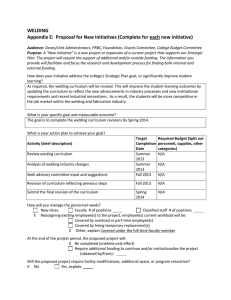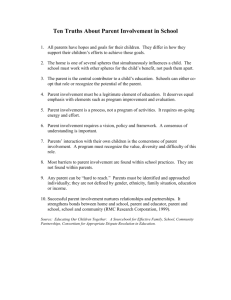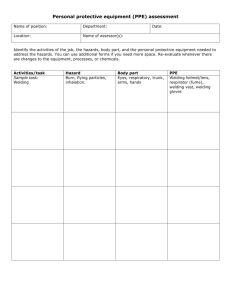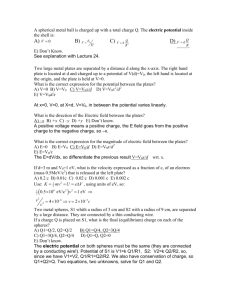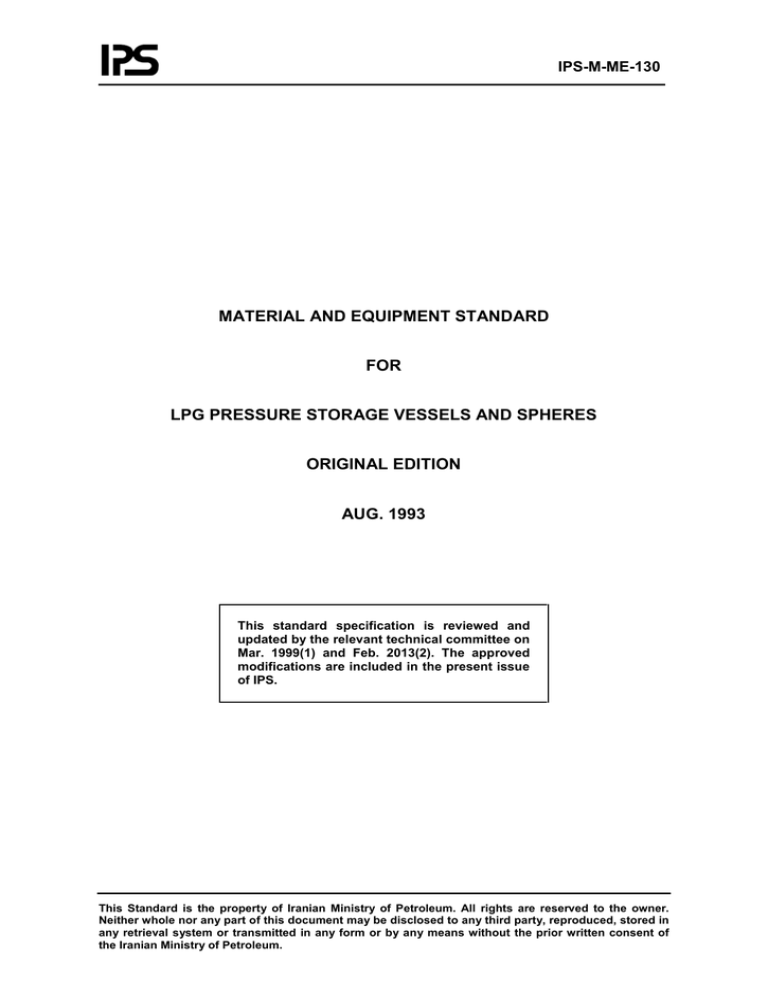
IPS-M-ME-130
MATERIAL AND EQUIPMENT STANDARD
FOR
LPG PRESSURE STORAGE VESSELS AND SPHERES
ORIGINAL EDITION
AUG. 1993
This standard specification is reviewed and
updated by the relevant technical committee on
Mar. 1999(1) and Feb. 2013(2). The approved
modifications are included in the present issue
of IPS.
This Standard is the property of Iranian Ministry of Petroleum. All rights are reserved to the owner.
Neither whole nor any part of this document may be disclosed to any third party, reproduced, stored in
any retrieval system or transmitted in any form or by any means without the prior written consent of
the Iranian Ministry of Petroleum.
Aug. 1993
IPS-M-ME-130
FOREWORD
The Iranian Petroleum Standards (IPS) reflect the views of the Iranian Ministry of Petroleum and are
intended for use in the oil and gas production facilities, oil refineries, chemical and petrochemical
plants, gas handling and processing installations and other such facilities.
IPS are based on internationally acceptable standards and include selections from the items
stipulated in the referenced standards. They are also supplemented by additional requirements
and/or modifications based on the experience acquired by the Iranian Petroleum Industry and the
local market availability. The options which are not specified in the text of the standards are
itemized in data sheet/s, so that, the user can select his appropriate preferences therein.
The IPS standards are therefore expected to be sufficiently flexible so that the users can adapt
these standards to their requirements. However, they may not cover every requirement of each
project. For such cases, an addendum to IPS Standard shall be prepared by the user which
elaborates the particular requirements of the user. This addendum together with the relevant IPS
shall form the job specification for the specific project or work.
The IPS is reviewed and up-dated approximately every five years. Each standards are subject to
amendment or withdrawal, if required, thus the latest edition of IPS shall be applicable
The users of IPS are therefore requested to send their views and comments, including any
addendum prepared for particular cases to the following address. These comments and
recommendations will be reviewed by the relevant technical committee and in case of approval will
be incorporated in the next revision of the standard.
Standards and Research department
No.17, Street14, North kheradmand
Karimkhan Avenue, Tehran, Iran .
Postal Code- 1585886851
Tel: 88810459-60 & 66153055
Fax: 88810462
Email: Standards@ nioc.ir
1
Aug. 1993
IPS-M-ME-130
GENERAL DEFINITIONS
Throughout this Standard the following definitions shall apply.
COMPANY :
Refers to one of the related and/or affiliated companies of the Iranian Ministry of Petroleum such as
National Iranian Oil Company, National Iranian Gas Company, National Petrochemical Company
and National Iranian Oil Refinery And Distribution Company.
PURCHASER :
Means the “Company" where this standard is a part of direct purchaser order by the “Company”,
and the “Contractor” where this Standard is a part of contract document.
VENDOR AND SUPPLIER:
Refers to firm or person who will supply and/or fabricate the equipment or material.
CONTRACTOR:
Refers to the persons, firm or company whose tender has been accepted by the company.
EXECUTOR :
Executor is the party which carries out all or part of construction and/or commissioning for the
project.
INSPECTOR :
The Inspector referred to in this Standard is a person/persons or a body appointed in writing by the
company for the inspection of fabrication and installation work.
SHALL:
Is used where a provision is mandatory.
SHOULD:
Is used where a provision is advisory only.
WILL:
Is normally used in connection with the action by the “Company” rather than by a contractor,
supplier or vendor.
MAY:
Is used where a provision is completely discretionary.
2
Aug. 1993
CONTENTS:
IPS-M-ME-130
PAGE No.
0. INTRODUCTION ............................................................................................................................. 4
1. SCOPE ............................................................................................................................................ 5
2. REFERENCES ................................................................................................................................ 5
3. UNITS .............................................................................................................................................. 6
4. GENERAL REQUIREMENTS ......................................................................................................... 6
5. DESIGN ........................................................................................................................................... 7
6. MATERIAL ...................................................................................................................................... 7
7. FABRICATION ................................................................................................................................ 9
8. ERECTION AND PREPARATION FOR SITE ERECTION .......................................................... 11
9. WELDING ...................................................................................................................................... 11
10. INSPECTION AND TEST ........................................................................................................... 13
11. SUPPLEMENTARY REQUIREMENTS ...................................................................................... 14
12. GUARANTEE .............................................................................................................................. 14
APPENDICES:
MANDATORY APPENDIX 43 (Add.) QUOTATION ...................................................................... 15
MANDATORY APPENDIX 44 (Add.) SECRECY ........................................................................... 16
MANDATORY APPENDIX 45 (Add.) GUARANTEE ..................................................................... 17
3
Aug. 1993
IPS-M-ME-130
0. INTRODUCTION
Storage Tanks are broad and contain variable types and usages of paramount importance,
therefore, a group of Material Standards are prepared to cover the subject. This group includes the
following standards:
STANDARD CODE
STANDARD TITLE
IPS-G-ME-100
“General Standard for Atmospheric Above Ground Welded Steel
Storage Tanks”
IPS-G-ME-110
IPS-M-ME-120
“General Standard for Large Welded Low Pressure Storage Tanks”
“Material and Equipment Standard for Aviation Turbine Fuel
Storage Tanks”
IPS-M-ME-130
“Material and Equipment Standard for for LPG Pressure Storage
Vessels and Spheres”
The requirements given in this Standard Supplement those of ASME pressure vessels code section
VIII Division 1, 2011 edition.
For ease of reference, the clause or section numbering of ASME for items supplemented is given at
the beginning of each paragraph.
For the purpose of this Standard specification, the following definitions shall hold:
Sub. (Substitution) :
The ASME Standard clause is substituted by a new
clause.
Del. (Deletion)
:
The ASME Standard clause is deleted without any
replacement.
Add. (Addition)
:
A new clause with a new number is added.
Mod. (Modification) :
Part of the ASME Standard clause is modified, and/or a
new description and/or condition is added to that clause.
4
Aug. 1993
IPS-M-ME-130
1. SCOPE
1.1 This Material and Equipment Standard covers the minimum requirements for LPG pressure
storage vessels and spheres.
Pressure storage, in this Standard, means storage spheres with design pressure above 100 kPa (1
bar) gage. The requirements of this specification apply to both refrigerated and non refrigerated
LPG pressure storage spheres.
1.2 This material and equipment standard gives general requirements to be met by a vendor when
submitting quotations for and when supplying the material to be incorporated into the pressure
storage spheres.
1.3 Furthermore, the terms and conditions laid down in the inquiry and the purchase order and any
attachments thereto shall apply.
1.4 It should be noted that when the design and construction of pressure storage spheres are
involved, the requirements of Iranian Petroleum Engineering and construction Standards for
pressure storage spheres (IPS-E-ME-130 , IPS-C-ME-130) shall be met.
Note 1:
This standard specification is reviewed and updated by the relevant technical committee on
Mar. 1999. The approved modifications by T.C. were sent to IPS users as amendment No. 1
by circular No. 71 on Mar. 1999. These modifications are included in the present issue of IPS.
Note 2:
This standard specification is reviewed and updated by the relevant technical committee on
Feb. 2013. The approved modifications by T.C. were sent to IPS users as amendment No. 2
by circular No. 376 on Feb. 2013. These modifications are included in the present issue of
IPS.
2. REFERENCES
Throughout this Standard the following dated and undated standards/codes are referred to. These
referenced documents shall, to the extent specified herein, form a part of this standard. For dated
references, the edition cited applies. The applicability of changes in dated references that occur
after the cited date shall be mutually agreed upon by the Company and the Vendor. For undated
references, the latest edition of the referenced documents (including any supplements and
amendments) applies.
API
(AMERICAN PETROLEUM INSTITUTE)
API 2510
“Design and Construction of Liquefied Petroleum Gas (LPG)
Installations, May 2001”
NACE (NATIONAL ASSOCCIATION OF CORROSION ENGINEERS)
MR-0175/ISO 15156
AWS
“Petroleum and Natural Gas Industries - Material for use in H2S –
Containing Environments in Oil and Gas Production”
(AMERICAN WELDING SOCIETY)
5
Aug. 1993
IPS
IPS-M-ME-130
(IRANIAN PETROLEUM STANDARDS)
IPS-E-ME-130
“Engineering Standard for Pressure Storage Spheres”
IPS-C-ME-130
“Construction Standard for Pressure Storage Spheres”
IPS-E-GN-100
“Engineering Standard for Units”
ASME (AMERICAN SOCIETY OF MECHANICAL ENGINEERS)
Section VIII
“Rules for Construction of Pressure Vessels”
Division 1 or 2
Section II
“Materials”
Section IX
“Welding and Brazing Qualifications”
ASME B1.1
“Unified Inch Screw Threads”
ASME B16.9
“Factory –Made Wrought Butt welding Fittings”
ASME B16.5-2009
“Pipe Flanges and Flanged Fittings”
ASME B31.3-2010
“Process Piping”
ASTM (AMERICAN SOCIETY FOR TESTING AND MATERIALS)
A578/A578 M
ISO
“Standard Specification for Straight – Beam Ultrasonic Examination
of Rolled Steel Plates for Special Application”
(INTERNATIONAL ORGANIZATION FOR STANDARDIZATION)
ISO 6708-1995
“Pipework Components-Definition and Selection of DN (Nominal
Size)”
3. UNITS
International System of Units (SI) in accordance with IPS-E-GN-100 shall be used.
Whenever reference is made to API, ASME or any other standard, equivalent SI Unit System for
dimensions, fasteners and flanges shall be substituted.
For pipe size, the international nomenclature "diameter nominal" written as DN 15,25,32,40, etc.
has been used in accordance with ISO 6708, 1995, ASME B16.5, 2009 and ASME B 31.3, 2010.
Also for pipe flanges, pressure temperature ratings "pressure nominal" written as PN 20, 50, 64, etc.
has been used in accordance with the said standards.
4. GENERAL REQUIREMENTS
4.1 Quotation (Add.)
Refer to Mandatory Appendix 43 of this Standard for general information to be submitted in the
quotation.
4.2 Secrecy (Add.)
Refer to Mandatory Appendix 44 of this Standard for secrecy requirements.
6
Aug. 1993
IPS-M-ME-130
5. DESIGN
5.1 Design of pressure storage spheres shall be in accordance with ASME section VIII division 1.
Where justified, pressure storage spheres may be designed according to division 2 of ASME
section VIII.
The requirements of Iranian Petroleum Engineering Standard for pressure storage spheres (IPS-EME-130) shall be also met. The followings shall be considered as supplementary:
5.2 (UG 54c Add.)
The pressure retaining parts of sphere and their support columns shall be designed to be filled with
water.
6. MATERIAL
6.1 Material selection for pressure storage spheres shall meet the requirements of section II of the
ASME boiler and pressure vessel code.
Requirements of API 2510 for pressure storage of LPG spheres shall be met. The followings shall
be considered as supplementary:
6.2 (UG-4 Add.)
Low melting point materials of construction such as aluminum and brass, shall not be used for LPG
storage spheres.
6.3 (UG-4 Add.)
Low ductility materials such as cast iron, semi killed steel, malleable iron and cast aluminum shall
not be used in any pressure retaining accessory parts.
6.4 (UG-4 Add.)
Mill certificates for the following materials shall be submitted for purchaser’s approval.
-
Shell plates and reinforcing pads.
Forging materials such as flanges, nozzle/manhole necks.
Support columns and bracings.
Pipes and fittings for nozzle necks.
Welded attachments to pressure retaining parts.
Bolts and nuts for pressure retaining parts
6.5 (UG 4 Add.)
Pressure retaining materials to be welded shall have the following chemical composition.
Carbon Equivalent (CE): CE ≤ 0.41 %
7
Aug. 1993
Where:
CE = C +
IPS-M-ME-130
Mn Cr + Mo + V Ni + Cu
+
+
6
5
15
6.6 (UG-4 Add.)
Material for pressure retaining parts specified for use in H2S service, where defined in para. 1.3 of
NACE standard MR-0175/ISO 15156, shall be selected in accordance with the said standard.
6.7 (UG-4 Mod.)
Materials of non pressure retaining parts to be welded directly to pressure retaining parts shall be of
the same quality material as the pressure retaining parts.
6.8 (UG-44 Add.)
Flange for sphere nozzles and connections shall be a minimum of PN 20 (150#) flange class. All
fittings shall have a minimum nominal diameter of DN 20 (¾").
6.9 (UG-12 Add.)
The internal bolts and nuts including U bolts shall be of TP- 405 or 410 stainless steel.
6.10 (UG-8 Add.)
Where connections are made to external piping, the material and all other requirements for nozzles,
flanges, bolts, gaskets and pipes shall be met as specified in that piping class.
6.11 (UG-11 Add.)
Manholes and blanked off nozzles shall have gaskets conforming to the piping specification for lines
connecting to the storage spheres nozzles, unless otherwise specified.
6.12 (UG-4 Add.)
Materials equivalent to ASTM standard may be used with the prior approval of the purchaser.
6.13 (UG-12 Add.)
Bolting for pressure parts shall be as follows:
6.13.1 Stud bolts shall be threaded full length, be semi finished and conform to ASME class 2A
dimensions, and shall have semi finished nuts conforming to ASME heavy nuts having class 2B
dimensions.
6.13.2 Bolting shall normally be used in accordance with ASME B1.1, unified screw threads.
Nominal size 25 mm and smaller shall be of the coarse thread series, nominal size 28 mm bolts and
larger shall be of the 8 thread series.
6.13.3 Nuts shall be double chamfered.
6.14 (UG-44 Add.)
Butt welding fittings shall be seamless, of the same thickness and schedule of the piping, and
conform to ASME B16.9.
8
Aug. 1993
IPS-M-ME-130
Socket welding fittings DN 50 (2") or smaller in dia. size, such as elbows, tees, and couplings, shall
be of forged steel and shall have a working pressure of at least 13.8 MPa (2000 Psi).
7. FABRICATION
7.1 (UG-75 Add.)
Works including welding shall be done, as much as possible, at shop to minimize field assembling
work. Adjacent pieces, to be assembled at site, shall be shop fitted, and the match shall be marked
to ensure proper site fit up.
7.2 (UG-79 Add.)
Shell plates shall be formed with accurate dimensions so that they are easily assembled at site. All
nozzles and manholes shall be prefabricated and welded to the shell plates concerned at shop.
7.3 (UG-79 Add.)
shop fabrication tolerances for the prefabricated sections such as shell plates, support columns,
nozzles etc. shall be as follows:
7.3.1 The shell plate thickness after forming shall not be less than the required design thickness by
the amount of 0.25 mm or 6% of the design thickness, whichever is smaller.
7.3.2 Allowable tolerance for arc length shall be in accordance with Table 1 below:
TABLE 1 - TOLERANCES FOR ARC LENGTH
OF SHELL PLATE
MEASURING PORTION
W 1, W 2, W 3
L1, L2
D1, D2
ALLOWABLE TOLERANCES
±1. 5mm
±1. 5mm
< 3. 9mm
7.3.3 The inner surface of formed shell plate shall not deviate more than 3 mm from the specified
curvature over a span of 1.5 meter. see Fig. 1 below:
9
Aug. 1993
IPS-M-ME-130
H1, H2, H3 = 3 mm
PERMISSIBLE DEVIATIONS OF INNER SURFACE
OF FORMED SHELL PLATES
Fig. 1
7.3.4 Projection, location and inclination tolerances for flange of nozzles and manholes shall be as
shown in Table 2 below:
TABLE 2 - TOLERANCES OF NOZZLES AND MANHOLES
CONNECTED TO PIPING
PROJECTION
LOCATION
INCLINATION
±6 mm
±15 mm
±0.5°
NOT CONNECTED TO
PIPING
±25 mm
±25 mm
±1°
7.3.5 Shop fabrication tolerances for the prefabricated sections other than the above, such as
length and bolt circle diameter of support columns etc. shall be submitted for purchaser’s approval.
7.4 (UG-82c Add.)
The inner edge of manholes and nozzles shall conform to the sphere inside radius and be smooth
without sharp edge.
7.5 (UG-46 Add.)
All reinforcing pads shall be provided with a 6 mm NPT telltale hole which shall be left open.
7.6 (UG-85 Add.)
All flange facing and threaded connections shall be protected against oxidation during heat
treatment.
7.7 (UG-75 Add.)
Fabricator shall submit for purchaser’s approval the following drawings and documents within the
time specified and before start of fabrication.
7.7.1 All shop fabrication drawings.
7.7.2 A general arrangement drawing for each storage vessel and sphere. This drawing shall be to
scale and shall show the position of all mountings and accessories required, with reference to the
relevant detail drawing (s).
7.7.3 Static calculations for all members of the storage vessel/sphere for which the sizes are not
shown on the reference drawings.
7.7.4 In the event that only departure from the reference drawing is proposed with regard to the
material to be incorporated, detail drawings showing the proposed changes shall be submitted for
10
Aug. 1993
IPS-M-ME-130
approval.
7.7.5 Detail specification or drawings of any auxiliary materials to be supplied such as pressure and
vacuum relieving devices shall be also submitted for approval.
7.7.6 Four number of copies for each drawing for approval shall be submitted. A separate set of
drawings for each requisition is required.
8. ERECTION AND PREPARATION FOR SITE ERECTION
8.1 Field erection of pressure storage spheres shall be in accordance with Iranian Petroleum
Construction Standard IPS-C-ME-130 "General Requirements for Construction and Field Erection of
Pressure Storage Spheres".
8.2 spheres supports shall be fire proofed. The fireproofing encasement shall not, however, cover
any portion of the supports at points where they are welded to the shell of the sphere.
8.3 All plates and structural members shall be marked in accordance with a marking diagram to be
supplied by the manufacturer which shall also bear such other marks as may be required to
facilitate erection.
Erection marks shall be painted clearly on plates and structural members in symbols at least 50 mm
high, where practical, and in the case of curved plates, such marks shall be on the inside surface.
When required, erection marks may be hard stamped in symbols not less than 13 mm high which in
the case of plates shall be in the corner approximately 150 mm from either edge.
9. WELDING
9.1 Qualification for welding procedures, welders and welding operators shall be in accordance with
the requirements of ASME code section IX.
9.2 Welding on pressure storage sphere shall be in accordance with subsection "B" part UW of the
ASME pressure vessel code section VIII division I.
9.3 (UW-28a Mod.)
Fabricator shall submit to the purchaser his welding procedure specification and welders
qualification test records for approval prior to start of fabrication.
9.4 (UW-28 Add.)
All welding procedures submitted shall be identified with the specific item and purchase order
numbers.
9.5 (UW-26 Add.)
Fabricator shall submit for purchaser’s approval prior to material supply, his weld preparation
procedure including details of beveled plates to be supplied. This shall also conform to ASME
section VIII division I.
9.6 (UW-26 Add.)
Fabricator shall show on a drawing the applicable welding procedure and non destructive tests
required.
9.7 (UW-37 Add.)
Tack welds shall be made with the same type of electrode that is used for depositing the root pass.
9.8 (UW-35 Add.)
Full penetration welding with full fusion shall be required for all pressure retaining parts including
non pressure retaining parts to be welded to pressure retaining parts. All nozzles and manholes
11
Aug. 1993
IPS-M-ME-130
shall be attached to the shell by full penetration welds. Fillet welding is acceptable for the outside
circle of reinforcing plates.
9.9 (UW-14 Mod.)
All shell plate seams shall be cleared from nozzles, clips and other external parts by a minimum of
50 mm.
9.10 (UW-33 Add.)
Joints between plates in different thicknesses for shell plates shall be aligned at the inside surfaces.
9.11 (UW-39 Add.)
Welding sequence shall be established in order to perform a deliberate welding to minimize welding
stresses.
9.12 (UW-5 Add.)
Welding electrode shall be of AWS approved quality or equivalent. Welding electrodes for use with
carbon steels shall be "low hydrogen" type.
9.13 (UW-9 Add.)
All joints between shell plates shall be of double butt welded type with full penetration and complete
fusion.
9.14 (UW-27 Add.)
Single pass submerged arc welding through the full thickness of the material from one side only is
not permitted.
9.15 (UW-31 Add.)
Where more than one shell ring is required, longitudinal joints shall be staggered to allow at least
60° between longitudinal joints in adjacent sections. Where the orientation of shell connections will
not permit this spacing to be maintained, fabricators drawings shall show proposed location of
longitudinal seams for the purchaser’s consideration and approval. Openings shall not be placed in
weld seams insofar as it is practical and economical.
9.16 (UW-37 Add.)
Tolerance for the groove angle shall be within ± 5° and tolerance for the root opening shall be within
± 1 mm.
9.17 (UW-33 Add.)
Misalignment of sphere shell plates at edges to be butt welded shall be as per applicable code, but
it shall not exceed 3.2 mm for longitudinal joints and 4.8 mm for circumferential joints.
9.18 (UW-21 Add.) Slip on flanges should be avoided. If they are used, they shall be welded both
inside and outside.
12
Aug. 1993
IPS-M-ME-130
10. INSPECTION AND TEST
10.1 Shop inspection and testing of pressure storage spheres shall be performed in accordance
with the requirements of ASME code section VIII division I and the following requirements.
10.2 (UG-90 Mod.)
When the code symbols stamping is not required to the spheres, the items of inspection and testing
are considered to be the same as the items of inspection and testing specified in the code to be
performed by the manufacturer as the case of code symbol stamping required.
10.3 (UG-93 Add.)
The material inspection shall be performed to confirm the material certificates or mill test reports of
the materials as specified in para. 6.4 of this Standard.
10.4 (UG-93 Add.)
Where wet H2S service is specified, all plate materials to be used for pressure retaining parts shall
be subjected to an ultrasonic examination. The method and acceptance standard of ultrasonic
examination for the plates material to be used for the spheres shall be in accordance with ASTM
standard A578, acceptance (level 1).
10.5 (UG-103 Add.)
The radiographic examination shall be carried out before postweld heat treatment, if any, except
where the code specifies that the examination is to be performed after heat treatment.
10.6 Hardness test shall be made on the weld metal and heat affected zone for the following cases:
a) When specified ultimate tensile strength of shell plate is 490 MPa and over.
b) Where wet H2S service is specified.
Hardness test shall be performed after postweld heat treatment where this is to be conducted.
10.7 (UW-46 Add.)
All welding joints of pressure retaining parts and non pressure retaining parts shall be visually
inspected to confirm that there are no injurious defects in the weldments.
10.8 (UG-37 Add.)
Weld joints of reinforcing pad for opening shall be leak tested by pneumatic pressure. The test shall
be preferably performed at 98 kPa minimum using compressed air.
The test shall be carried out before postweld heat treatment where this is to be conducted.
10.9 (UG-96 a Mod.)
After completion of prefabricated sphere sections, dimensional Inspection shall be made to assure
that the tolerances are within the permissible ranges specified in the applicable code and in this
Standard specification.
13
Aug. 1993
IPS-M-ME-130
10.10 (UG-90 b Mod.)
It shall be the responsibility of the fabricator to maintain adequate inspection in his own or his sub
contractor’s works to ensure that the requirements of the specified inspection and test are met.
Purchaser however reserves the right of access at all times to monitor or complement any such
inspection.
11. SUPPLEMENTARY REQUIREMENTS (UG-120 Add)
11.1 Vendor shall send final issues of all drawings mentioned under 7.7 together with dispatch lists
of materials to the purchaser, the same number of copies as stated in 7.7.7 is required.
11.2 All drawings etc. mentioned under 7.7 and 11.1 will, in every respect, be the property of
purchaser who shall have the right to use and reuse them for any purpose whatsoever without any
obligation to vendor.
11.3 Papers used for drawings and prints shall be suitable for the purpose, according to TAPPI TIP
0404-36-04, Paper Grade Classification, or, as approved by the Company.
TAPPI: Technical Association of the Pulp and Paper Industry
12. GUARANTEE (Add.)
12.1 Reference is made to Mandatory Appendix 45 of this Standard for guarantee requirements.
14
Aug. 1993
IPS-M-ME-130
APPENDICES
MANDATORY APPENDIX 43 (Add.)
QUOTATION
A.1 The following information shall be submitted in the quotation:
A.1.1 Price.
A.1.2 Estimated total shipping weight of materials for each sphere with accessories.
A.1.3 Delivery time of the materials.
A.1.4 Steel grades offered.
A.1.5 Plate thicknesses.
A.1.6 Any deviations or exclusions from the stipulations referred to in this specifications if no
deviations or exclusions are mentioned in the quotation, it will be deemed to be fully in compliance
with said stipulations.
Vendor is free to offer as an alternative, before the purchase order is placed, deviations from the
required standards, if these result in a reduction in costs.
A.1.7 The names of subcontractors, if any for the fabrication or any part thereof. Such
subcontractors shall be subject to acceptance by purchaser.
A.2 Any purchase order will be subject to all terms, conditions, etc. forming part of the inquiry and
any agreed amendments to it.
15
Aug. 1993
IPS-M-ME-130
MANDATORY APPENDIX 44 (Add.)
SECRECY
Vendor shall not disclose or issue to third parties without the written consent of purchaser any
documents, etc. placed at his disposal by purchaser or any documents prepared by himself in
connection with inquiries and purchase orders for purposes other than the preparation of a
quotation or carrying out such purchase orders.
16
Aug. 1993
IPS-M-ME-130
MANDATORY APPENDIX 45 (Add.)
GUARANTEE
C.1 Vendor shall guarantee that the materials delivered to be incorporated into pressure storage
sphere(s) are in accordance with the purchase order and will be free from any defects in design,
workmanship and material and that they will give proper service under the operating and design
conditions as specified, for a period of 18 months, reckoned from the day on which the sphere(s)
are delivered.
C.2 The period of 18 months specified above shall be extended by any period(s) during which the
spheres after delivery are out of action as a result of any defect covered by this guarantee.
C.3 In the event of defects covered by this guarantee purchaser shall notify vendor as soon as
possible and vendor shall without delay remedy or repair free of charge (cost of labor and
transportation not excluded) the spheres having such defects, or authorize purchaser to do so. In
the latter event vendor shall reimburse to purchaser the actual out of pocket costs, excluding over
heads and similar administrative costs.
C.4 Remedying and repairing may be effected by purchaser without prior approval by vendor in
cases where it would be unreasonable to demand that prior approval be obtained. In such cases
vendor and purchaser shall agree which party shall bear the costs and expenses there of or in what
proportion these costs and expenses shall be divided between them. This guarantee shall remain in
effect, provided the remedying and repairing do not result in any detriment to the sphere(s).
C.5 In no event will this guarantee cover defect due to normal wear and tear, disregard by
purchaser or his consignee of operating instructions, excessive over loading by purchaser or his
consignee or unsuitable operating conditions.
17


